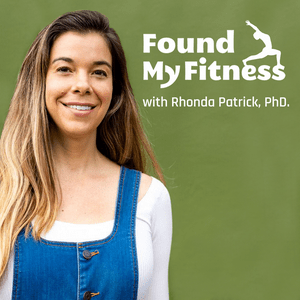Get access to more than 70 Ask Me Anything episodes with Dr. Rhonda Patrick when you sign up as a FoundMyFitness Premium Member
When testosterone runs low, libido isn't the only casualty—muscle mass drops, fat accumulates, insulin resistance rises, and motivation declines. In this episode, Derek from More Plates More Dates highlights common pitfalls that suppress testosterone and evaluates popular testosterone-boosting supplements like Tongkat Ali, boron, and ashwagandha, clarifying what's evidence-based versus overhyped. He also details practical strategies for testosterone replacement therapy (TRT), covering optimal delivery methods, benefits, risks, fertility implications, and key biomarkers to monitor.
Timestamps:
(00:00) Introduction
(04:50) Why is testosterone essential for men?
(07:11) The role of testosterone in women's health
(08:53) Does higher testosterone shorten lifespan?
(12:12) What the castrati reveal about testosterone and longevity
(15:07) Free vs. total testosterone—what's the difference?
(18:42) Best practices for measuring and interpreting testosterone levels
(21:29) Reference ranges or symptoms—which matters more?
(24:50) When is high testosterone a red flag?
(26:32) What LH and FSH reveal about testosterone production
(31:11) Could high SHBG levels be limiting your testosterone?
(35:02) Why SHBG increases with age—and how diet and lifestyle accelerate it
(39:45) Key symptoms of low testosterone in men
(42:46) Is alcohol sabotaging your testosterone levels?
(45:39) Why low-fat and low-carb diets might lower testosterone
(46:18) Common micronutrient mistakes hurting hormone levels
(48:12) How excess body fat impacts testosterone
(51:39) When endurance training goes too far
(56:02) Are endocrine disruptors truly harming male hormones?
(58:42) Debunking myths about declining testosterone in men
(1:01:32) Why dietary fat is essential for hormone health
(1:03:55) Is a ketogenic diet bad for testosterone?
(1:05:10) Which type of exercise boosts testosterone most?
(1:07:16) Do vitamin D, zinc, and magnesium actually help?
(1:11:36) Does boron significantly raise free testosterone?
(1:12:45) Ashwagandha's true potential for testosterone enhancement
(1:17:00) Is Tongkat Ali the best herbal testosterone booster?
(1:20:51) Tongkat Ali or boron—which is superior?
(1:22:20) Shilajit, Tribulus, Fenugreek—do they actually work?
(1:23:33) The four best supplements to raise testosterone levels
(1:25:17) Dutch test vs. blood test—which is better for cortisol?
(1:26:32) When should you consider testosterone replacement therapy (TRT)?
(1:34:23) What realistic benefits can TRT provide?
(1:37:34) Does TRT raise heart disease and erythrocytosis risk?
(1:47:23) Creams vs. injections
(1:48:47) Does TRT increase prostate cancer risk?
(1:51:01) Hair loss, acne, sleep apnea—what are TRT's real side effects?
(1:53:41) The rollercoaster effect of testosterone injections
(1:56:15) Could low testosterone be riskier than TRT?
(1:59:38) Choosing the right TRT delivery method
(2:06:16) Do smaller, more frequent injections reduce risks?
(2:08:12) Can you maintain fertility while on TRT?
(2:16:12) Why TRT quickly shrinks testicles
(2:17:40) Key biomarkers you must track on TRT
(2:26:57) Testosterone therapy for women—symptoms, ranges, and risks
(2:36:49) Can DHEA supplements safely raise testosterone in women?
(2:39:47) What actually causes hair loss?
(2:46:00) Does your maternal grandfather determine your hairline?
(2:46:48) Why stopping hair loss means accepting risks
(2:55:54) How effective are ketoconazole, minoxidil, and microneedling?
(2:58:55) Topical vs. oral minoxidil—how do side effects compare?
(3:02:00) Is microneedling effective without minoxidil?
(3:04:51) Do finasteride and dutasteride alter brain chemistry?
(3:06:03) Finasteride and the nocebo effect—are side effects imagined?
(3:07:37) Does minoxidil delay baldness or just mask it?
(3:09:06) Can dutasteride extend your lifespan?
Show notes, transcript, and summary are available by clicking here
Watch this episode on YouTube


